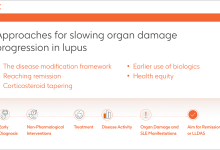Assessing Cardiovascular Risks: The Responsibility of the Rheumatologist Save

In 2016, the European League Against Rheumatism (EULAR) posted recommendations for the management of cardiovascular (CV) risks in patients with rheumatoid arthritis (RA) and other inflammatory joint diseases (IJD)1. Three overarching principles emerged, but one caught my attention: “the rheumatologist is responsible for CV disease risk management.” It leaves no room for interpretation.
Rheumatologists need to be actively involved in managing comorbidities especially when CV disease is involved. The recommendations further noted rheumatologists should assess and mitigate CV risk using a standardized scoring system, monitor patients’ lipids, and control disease activity. My initial thoughts when reading these recommendations were while they were good recommendations, implementing them may be impractical in the current practice environment. Visits are truncated to 15-20 min, diseases are complex, and there are so many other issues rheumatologists need to address with their patients: disease activity, medication side effects, test results, prior authorizations and denials, vaccinations, osteoporosis monitoring, and contraception. How will rheumatologists incorporate CV monitoring and risk mitigation in a short visit when other issues are more pressing? Burnout is high; are the guidelines asking too much from my colleagues?
I contemplated this issue over the last year, polling rheumatologists if they routinely assess CV risk and how they do it. The vast majority state they do not address this issue but rely heavily on primary care providers to do the task.
So why did the guidelines place the burden of CV risk monitoring on the rheumatologist?
The answer lies in the fact that CV disease is the leading cause of death in our patients with immune mediated inflammatory disease (IMID). Additionally, rheumatologists see these patients and obtain labs more frequently than their other doctors, and many primary care providers are nervous when managing complex patients whose symptoms may mimic other diseases. The rationale for assuming an active role makes sense, but how would we incorporate CV risk monitoring and mitigation into a busy practice? Fortunately, most of what we do for patients to help arthritis and inflammation will also reduce CV risk (e.g., control disease activity, weight loss, exercise, smoking cessation, and diet). Patients with multiple risk factors (e.g, diabetes, hypertension, hyperlipidemia, obesity, tobacco use, on chronic steroids, or older age) may benefit from additional CV assessments. Triaging these patients to a separate, dedicated visit or referring them to a cardiologist may be more appropriate if time management is an issue during a routine visit.
We all want the best care for our patients but are limited by time constraints. Sharing the care of the patient will help to reduce that burden. The more recently published 2021 EULAR recommendations2 on CV risk assessment for patients with gout, vasculitis, systemic sclerosis, myositis, mixed connective tissue disease, Sjogren’s syndrome, lupus, and anti-phospholipid syndrome are less jarring than the 2016 recommendations for RA and IJD. While the emphasis remains on the rheumatologists’ responsibility for CV risk assessment and management; the committee recommended doing this “in collaboration with primary care providers, internists or cardiologists and other healthcare providers.”
After careful consideration, I concluded rheumatologists are responsible for addressing CV risk and comorbidities. We should promote awareness about CV disease and treat patients according to best practices to mitigate risks while enlisting help from other specialties.
References:
- Ann Rheum Dis. 2017 Jan;76(1):17-28. doi: 10.1136
- Annals of the Rheumatic Diseases 2022;81:768-779.
Join The Discussion
Lovely piece Kathryn. I think it's hard in our busy clinics (and with our workforce shortage) to find the space to do it well, even though we know we shouild and that we're better equipped to do so than many others. I wonder whether we need dedicated help? Not just PCPs, but dedicated help, in the way that diabetes endocrinologists have.
Before he left us, Phil Robinson and I wrote this piece for Lancet Rheum:
https://www.ncbi.nlm.nih.gov/pmc/articles/PMC9381024/
Thanks for the beautiful piece once again!
I really like the idea of a nurse educator in rheum clinics to help with preventive care assessments and counseling. While cardiologists, endocrinologists find these services beneficial and cost-effective, I am not sure what the cost to benefit ratio is to have this service in place for rheumatologists.
We need more collaboration, for example, the Rheum-Cardiology clinics at Cleveland Clinic, Stanford, UCSF... Maybe more private practices can team up to treat the whole person. Excellent topic.
Yes!
Thank you Kathryn. This is a great article and raises important questions. I've been experimenting with how to engage primary care physicians on this issue and have found an effective method: I ensure that each patient has a fasting lipid profile (all results are copied to the PCP as a rule) and as soon as the lipid profile result appears in my inbox, I open the patient file and send a proforma letter to the PCP, stating:
"Please find a copy of (patient)'s fasting lipid profile below. Whilst this forms part of the standard cardiovascular risk calculation, (patient)'s rheumatic disease does not. When calculating (patient)'s cardiovascular risk, please consider adding a risk multiplier of 1.5/2.0/2.5 for (rheumatic disease)."
A brief summary of the evidence base is included below this, referencing Conrad et al. Ann Rheum Dis 2022; Published Online First: 28 November 2022. doi: 10.1136/ard-2022-223315.
Sending this letter requires little effort. I have found that in more cases than not, this results in a change of management on the part of the PCP.
I hope that my experience helps others negotiate this issue without adding unduly to the burden of care.
Great idea! We should create a smart phrase in the note to the PCP, and also an automated phrase for patients to remind them to discuss this issue.







If you are a health practitioner, you may Login/Register to comment.
Due to the nature of these comment forums, only health practitioners are allowed to comment at this time.